Sino-Japan ties 'at crossroads'
Updated: 2014-09-29 03:21
By Cai Hong in Tokyo(China Daily)
|
||||||||
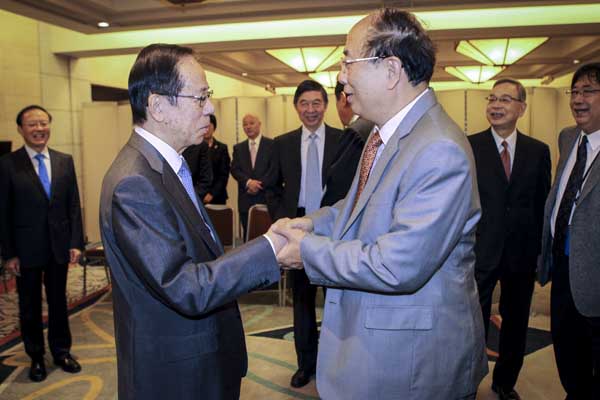 |
|
Zhao Qizheng (right), former minister of the State Council Information Office, meets Yasuo Fukuda, former Japanese prime minister, during the 10th Beijing-Tokyo Forum in Tokyo on Sunday. Zhao has taken part in all 10 forums. Zou Hong / China Daily |
Relationship continues to be beset by historical and territorial disputes
The relationship between China and Japan is at a crossroads, and Japan's attitude and approach to dealing with the history of its militarist aggression can sway where the ties will head, a senior Chinese official said on Sunday at a bilateral forum.
Cai Mingzhao, minister of the State Council Information Office, said Sino-Japan diplomatic relations — which have survived 42 years of fluctuations since being normalized in the years following World War II — are supposed to be rational and mature, just like people are believed to be when in their 40s.
"But, unfortunately, the healthy development of bilateral ties is still beset by many issues," he said at the opening ceremony of the 10th Beijing-Tokyo Forum held in Tokyo on Sunday.
"The fact that the ties have been stuck in a difficult situation in recent years is the concern of people in the two countries and has come to the attention of the international community."
Under the theme of peace in East Asia and the responsibilities of China and Japan, the annual forum, which runs on Sunday and Monday, deliberates on the power of dialogue to overcome obstacles.
Cai attributed the stalemate to right-wing elements in Japan.
Some Japanese policies and approaches have gone against the principles guiding the normalization of ties and the consensus the two countries had reached.
For example, Japanese Prime Minister Shinzo Abe visited the Yasukuni Shrine in December 2013, and the Japanese government "nationalized" China's Diaoyu Islands, changing the four-decade status quo of the dispute and letting the territorial issue develop.
Without objective understanding of history, Japan's right-wing figures are riding against the tide of history and walking down a dangerous road, Cai said.
After the relationship was normalized, the Japanese government and several leaders apologized for the hurt Japan caused other countries.
In his keynote speech, Cai differentiated Japan's militarists and its people. He said the Chinese government and people blame Japanese militarists for the sufferings Japan's aggression caused China, clearing Japanese people of war crimes.
"Keeping history in mind does not necessarily mean that we let hatred live," said Chinese Ambassador to Japan Cheng Yonghua.
Japanese Foreign Minister Fumio Kishida said the Japan-China relationship is one of Japan's most important bilateral ties. He spoke highly of the non-government platform that the Beijing-Tokyo Forum has established in the decade of its existence.
Kishida acknowledged that attention should be paid to the fact that people in the two countries are worried about the status of relations. "Based on public opinion, the catalyst should be found to improve the ties," he said.
China Daily and Japan's Genron NPO initiated the forum in 2005 when China-Japan relations dropped to the freezing point.
"The forum is designed to help the two countries understand each other, find more common ground and promote friendship," China Daily Editor-in-Chief Zhu Ling said.
The latest opinion polls carried out by the two sponsors in China and Japan in July and August found that people acknowledged the importance of the relationship, although their feelings about each other's country have hit a record low.
"It is a shame if the strained relations between the world's second- and third-largest economies become an area of conflict," former Japanese prime minister Yasuo Fukuda said.
The GDP of China, South Korea and Japan equals that of the United States, and East Asia is the locomotive of the world's development, Fukuda said.
- China bans tourism disguised as government business
- China urges to restart Six Party Talks as soon as possible
- China calls for concerted efforts to seek peace in Middle East
- FM calls for more global assistance as Ebola epidemic rages
- Conflicts in Ukraine remain cause of concern: FM
- Beijing welcomes its vintage tour bus

 Splendid China
Splendid China
 Police: Ferguson officer shot; 2 suspects wanted
Police: Ferguson officer shot; 2 suspects wanted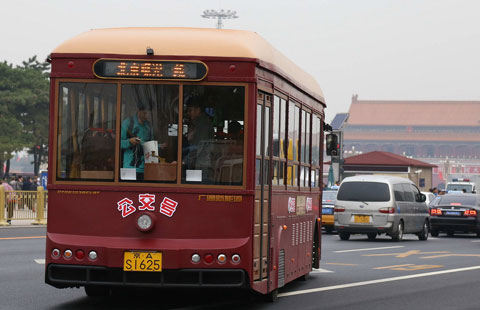
 Beijing welcomes its vintage tour bus
Beijing welcomes its vintage tour bus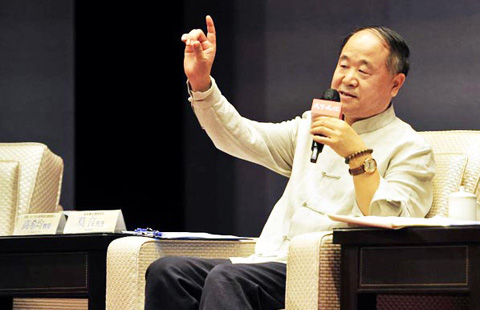
 Mo Yan awarded highest honor of oldest Bulgarian university
Mo Yan awarded highest honor of oldest Bulgarian university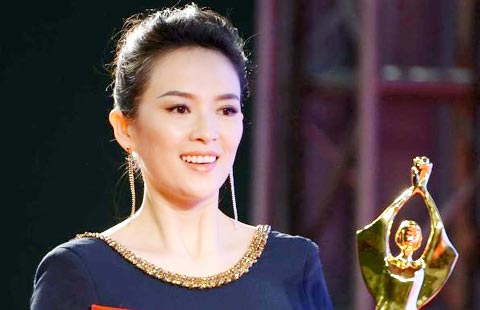
 Hundred Flowers Award ceremony opens in Lanzhou
Hundred Flowers Award ceremony opens in Lanzhou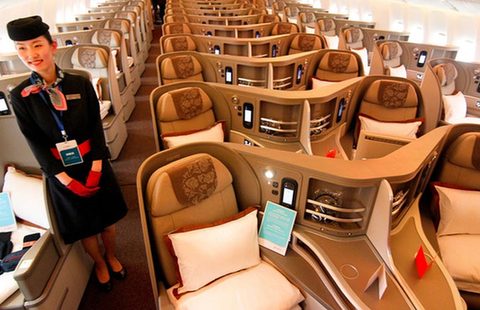
 Luxurious new Boeing 777 delivered to China Eastern
Luxurious new Boeing 777 delivered to China Eastern
 Muslims gather for annual hajj pilgrimage in Mecca
Muslims gather for annual hajj pilgrimage in Mecca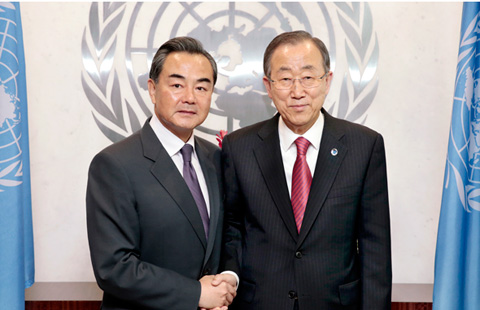
 Chinese FM meets UN chief
Chinese FM meets UN chief
Most Viewed
Editor's Picks

|

|

|

|

|

|
Today's Top News
15 people, mostly teens, shot at Miami nightclub
Police: Ferguson officer shot; 2 suspects wanted
Central govt opposes illegal activities in HK
Chinese FM reaffirms support for UN
China bans tourism disguised as government business
Book of Chinese president's remarks on governance published
Chinese leaders to mark Martyrs' Day
China hopes for Iraq's early return to stability
US Weekly

|

|








